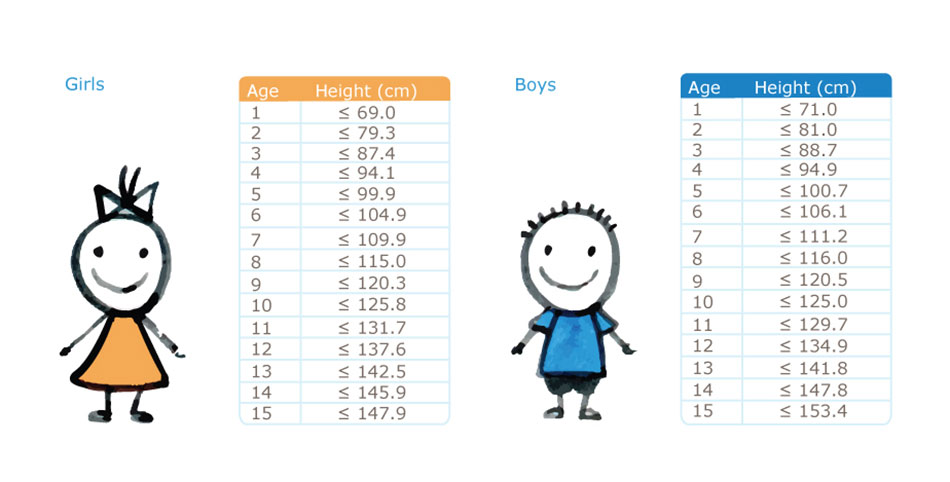A person’s height depends on several key factors, such as genetics, nutrition, environment and related diseases. Among these, only genetic factors cannot be changed, while the other factors can be influenced.
Common causes of growth retardation in children include malnutrition, intrauterine issues, being born small for their gestational age (SGA), chronic kidney failure, and hormone deficiency. Congenital or acquired growth hormone (GH) deficiency may be due to brain tumours, or the result of radiation therapy which has been applied to the head and face. Sometimes children fail to reach their optimal height due to diseases related to chromosomal disorders, such as Turner Syndrome (which only affects girls, and is when one of the X chromosomes is missing or partially missing) or bone dysplasia, while some causes are idiopathic.
Among the causes of growth retardation in children, the prevalence of GH deficiency is estimated to account for only about one in 4,000 to one in 10,000 children, but it is one of the most important as its cause is hard to recognise and the condition is not well-known in the community. Intervention is required if a child lacks GH at an early age. Screening, early diagnosis and timely treatment at the “golden stage” before puberty will help to improve the process of promoting growth in children and help them to achieve the optimal height in adulthood.
Children between the ages of four and 13 years old who have not shown signs of puberty and who have a GH deficiency will have a lower height for their age, typically less than -2 standard deviations based on the growth chart, and a slow growth rate (under five centimetres per year). While a mild GH deficiency does not affect a child’s health, being much shorter than average can adversely affect a child’s confidence and make them feel alienated from or inferior to their friends.

Take your child to the doctor if he or she is below this height or growing fewer than 5 cm per year
Indications for growth hormone injections to improve height for children have now been approved by the U.S. FDA for the following cases: growth hormone deficiency, growth hormone resistance and idiopathic dwarfism.
In addition, for the following, children can be prescribed growth hormone injections, whether or not they have a lack of growth hormone, in the following instances:
- Babies who were born smaller than their gestational age, and after two years of age are still below the average height and weight
- Chronic kidney failure
- Metabolic disorders
- Bone dystrophy
- Nutritional issues
- Chromosomal abnormalities
- Genetic disorders, such as Turner Syndrome, Prader-Willi Syndrome, Noonan Syndrome
Children who respond to treatment will increase in height from eight to 12 cm per year and need to be treated before they enter puberty. After puberty, the administering of growth hormone will no longer be efficient. The best time to start treatment is between the ages of four and 13 years, before a child’s cartilage becomes fixed. To achieve the best result, children need to be injected with the correct dose every night before going to bed, as directed by their doctor.
Dr Nguyen Thi Thu Huong, an endocrinologist who works at FV Hospital’s Department of Internal Medicine, recommends that parents measure their child’s height at least every six months, ideally every three months, and check their numbers against the WHO growth chart. If the baby’s height is found to be <-2SD or the baby’s growth rate is ≤ 2 cm in six months, this is an indication that something is abnormal.

If a child is showing signs of growth retardation, their parents or guardians should bring them to see an endocrinologist to learn if the cause is related to a deficiency of growth hormone, or due to underlying general paediatric issues without an identifiable cause. If a child shows signs of malnutrition, they will be referred to a nutritionist. Early detection and appropriate treatment will help to optimise the child’s height as they prepare to enter adulthood.
FV’s Endocrinology Unit, located within the Internal Medicine Department, offer consultations, screening and treatment via growth hormone supplements to help children to achieve their full height. The treatment of growth hormone supplements for height growth must be thoroughly diagnosed and determined.
When performing screening, doctors will ask details questions about the child’s birth history, related diseases and average growth rate. Additional to their clinical examination, they might measure the child’s height and take X-rays of the left hand bone when indicated to assess bone age. In suspected cases of delayed height growth due to GH deficiency, doctors will perform further in-depth tests and advise on the appropriate treatment direction.
To book an appointment with Dr Nguyen Thi Thu Huong, Endocrinology Unit, Department of Internal Medicine, please contact: 028 35 11 33 33.



